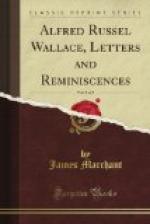Thiselton-Dyer tells me that H. Spencer is dreadfully disturbed on the question. He fears that acquired characters may not be inherited, in which case the foundation of his whole philosophy is undermined!—Yours very truly,
ALFRED R. WALLACE.
P.S.—I am afraid you are partly responsible for that kindly meant but too personal manifestation which disturbed the solemnity of the Royal Society meeting on Thursday!...
* * * * *
TO PROF. POULTON
Parkstone, Dorset. September 25, 1893.
My dear Poulton,—I suppose you were not at Nottingham and did not get the letter, paper, and photographs I sent you there, but to be opened by the Secretary of Section D in case you were not there. It was about a wonderful and perfectly authenticated case of a woman who dressed the arm of a gamekeeper after amputation, and six or seven months afterwards had a child born without the forearm on the right side, exactly corresponding in form and length of stump to that of the man. Photographs of the man, and of the boy seven or eight years old, were taken by the physician of the hospital where the man’s arm was cut off, and they show a most striking correspondence. These, with my short paper, appear to have produced an effect, for a committee of Section D has been appointed to collect evidence on this and other matters....—Yours very faithfully,
ALFRED R. WALLACE.
* * * * *
TO PROF. POULTON
Parkstone, Dorset. November 17, 1893.
My dear Poulton,—The letter I wrote to you at Nottingham was returned to me here (after a month), so I did not think it worth while to send it to you again, though it did contain my congratulations on your appointment,[22] which I now repeat. As you have not seen the paper I sent to the British Association, I will just say that I should not have noticed the subject publicly but, after a friend had given me the photographs (sent with my paper), I came across the following statement in the new edition of Chambers’ Encyclopaedia, art. Deformities (by Prof. A. Hare): “In an increasing proportion of cases which are carefully investigated, it appears that maternal impressions, the result of shock or unpleasant experiences, may have a considerable influence in producing deformities in the offspring.” In consequence of this I sent the case which had been furnished me, and which is certainly about as well attested and conclusive as anything can be. The facts are these:




